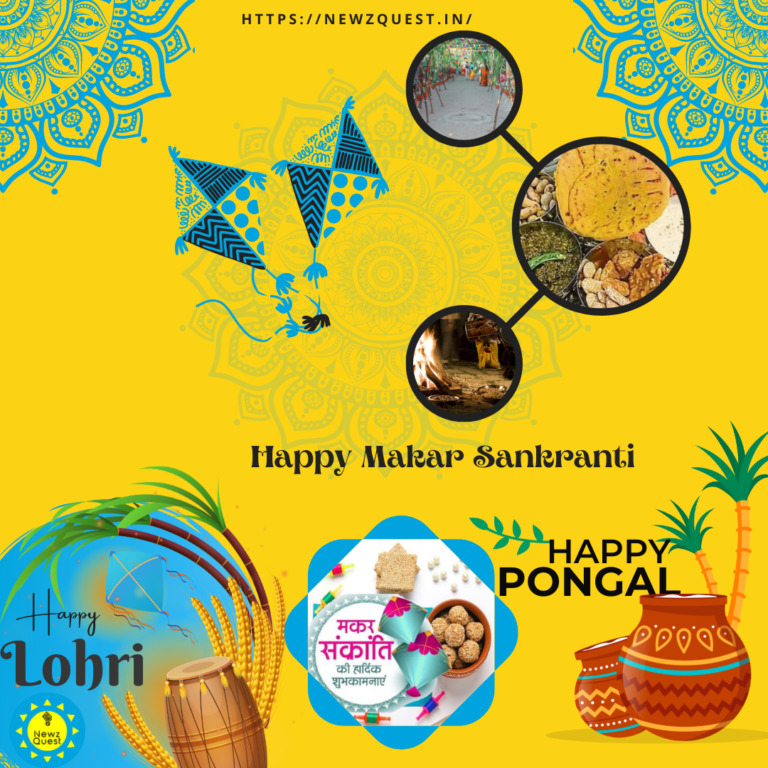
India is a country of events. Every state has its own events with significance and beauty that add to the beauty of the country. People follow different religions and have different customs and traditions. Therefore, India is rightly called the land of festivals and fairs where every day is a kind of celebration.
Let’s take a look at the different festivals celebrated in each state on January 14:
Lohri:
Lohri is a harvest festival celebrated in the northern regions of Punjab and Haryana. Lohri is celebrated on the last night of Paush month and on the morning of Makar Sankranti. Every year, people from different states celebrate this festival with great fear and enthusiasm.
The festival is celebrated in many states, but with different names. It’s Farmers’ Day. Farmers celebrate their bountiful harvest on this day. The specialty of this festival is that people light fire. They dance and rejoice in their harvest. Farmers’ produce such as corn, jaggery, rewari, gajak, peanuts and sesame seeds are put into the fire as an offering before being eaten as prasad.
Makar Sankranti
One of the most popular festivals in India, Makar Sankranti or Magha Sankranti is celebrated on January 14 or 15 every year. This festival is celebrated by farmers who harvest and sow new seeds. On this day people worship guns and there is a tradition of eating khichdi in some states. The application is made in Gujarat and Rajasthan. It is also practiced in other states, but with different names. People also exchange sweets in appreciation. Many choose to bathe in the river during this beautiful festival. Pongal:
When is Makar Sankranti 2023?
According to the Hindu calendar, on January 14, 2023, at 8:14 am, the Sun will pass through Capricorn and only after this transit, the Makar Sankranti festival will be celebrated. According to Udaya Tithi, Makar Sankranti, the festival of Khichdi, will be celebrated on January 15, 2023, because on this day there is a tradition of offering Argya at sunrise.
Makar Sankranti Muhurta
Muhurta: Makar Sankranti hours will start from 07:15 in the morning to 05:46 in the evening. On this day, the best time will be from 07:15 in the morning to 12:30 in the afternoon. Charity and charity in this Muhurta are considered very auspicious.
This time, the auspicious time of the Makar Sankranti festival will be the auspicious day of Magh Krishna Saptami on Saturday, the God of the Earth specifically, Lord Surya will enter Capricorn on January 14, 2023 at 08.43 minutes 54 seconds. According to the laws of Vedic India Sanatan Dharmashastras and according to astrology principles, if the Sun God enters from one sign of the zodiac to another after sunset in the evening, then his auspicious hour is said to be valid only when sunrise follows the day.
- मकरस्थे रवौ गङ्गा यत्र कुत्रावगाहिता । पुनाति स्नानपानाद्यैर्नयन्तीन्द्रपुरं जगत् ।।
Wherever one bathes in the Ganges during the transit of the Sun through Capricorn, he washes the whole world by bathing, etc. and finally reached Indralok. According to Srishti Khand of Padmapurana, one should bathe on Makar Sankranti. This gives the yield of ten thousand cows. Tarpan, the gift and worship of God at that time was new.
According to Garudpuran, during Makar Sankranti, the moon eclipses the sun, it is rare in the three worlds to go to Gayathirth and offer Pind Daan. On the day of Makar Sankranti, Lord Surya (milk, curd, ghee) to get Lakshmi and get rid of disease, Lord Shiva with sesame-jaggery to get rid of calamity and enemies, Devguru with clothes to get fame and knowledge, education , etc. Jupiter should be worshiped during Mahapunyakal/Punyakal.
On the day of Makar Sankranti, using sesame seeds (white and black) and offering sesame seeds is very beneficial. Especially sesame and jaggery based sweets like Revdi, Gajak etc. Sesame seeds should be mixed with bath water in the morning. According to Vishnu Purana, II: Chapter: 8
- कर्कटावस्थिते भानौ दक्षिणायनमुच्यते । उत्तरायणम्प्युक्तं मकरस्थे दिवाकरे ।।
Lorsque and Soleil are the first in Cancer, causing Dakshinayan and others in Capricorne, or s’appelle Uttarayan.
According to Dharmasindhu
तिलतैलेन दीपाश्च देया: शिवगृहे शुभा:। सतिलैस्तण्डुलैर्देवं पूजयेद्विधिवद् द्विजम्।।
तस्यां कृष्ण तिलै: स्नानं कार्ये चोद्वर्त्नम तिलै: .
तिला देवाश्च होतव्या भक्ष्याश्चैवोत्तरायणे
अत्र शंभौ घृताभिषेको महाफलः . वस्त्रदानं महाफलं
Le jour de Makar Sankranti, oindre (bain) Mahadev ji ghee donne d’excellent results. Donating clothes to the poor has great results.
“अत्र क्षीरेण भास्करं स्नानपयेव्सूर्यलोकप्राप्तिः”
On this Sankranti, if you bathe the sun with milk, then you will get the world of the sun. According to Narada Purana
“क्षीराद्यैः स्नापयेद्यस्तु रविसंक्रमणे हरिम् ।
स वसेद्विष्णुसदने त्रिसप्तपुरुषैः सह ।।
One who bathes Shri Hari with milk. on the day of Surya Sankranti, it becomes part of good deeds.
Pongal
This festival is celebrated in southern India, especially in Tamil Nadu. Farmers’ festivals are the same for Makar Sankranti and Lohri. This festival takes place when people give the sun god called Pongal prasad, hence the name of the festival is Pongal.
The festival is celebrated for four days as Bhogi Pongal, Surya Pongal, Mattu Pongal and Kanya Pongal. On this day, people decorate their homes with rangoli. Rangoli known as Kolam is used to decorate even roads. People also celebrate the festival with bull fighting, which is also known as Jallikattu in Tamil Nadu.
Magh Bihu
Magh Bihu, also known as Bhogali Bihu, is celebrated in Assam. It is also the harvest festival of Assam. The festival means bhog/feast and is celebrated with feasts, bonfires and many traditional games. @parashar
